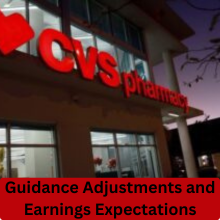
In a surprising shake-up, CVS Health has announced the replacement of CEO Karen Lynch with longtime executive David Joyner. This leadership change comes on the heels of significant challenges faced by the company, including declining profits and a sharp drop in stock performance. As CVS navigates these turbulent waters, the spotlight now turns to Joyner and his vision for revitalizing the company.
Overview of CVS’s Recent Leadership Changes
Effective Thursday, just before the announcement, Joyner steps into the CEO role, with Lynch also exiting from the board of directors. This move reflects CVS’s urgent need to stabilize its operations and restore investor confidence. The company has seen its stock plummet nearly 20% this year, prompting questions about its future trajectory.
Context Behind the Decision
CVS’s struggles are multi-faceted. From rising medical costs impacting its insurance unit, Aetna, to decreasing consumer spending at its retail pharmacies, the company has faced a perfect storm of financial challenges. The leadership change comes as CVS has already cut its full-year profit guidance and announced plans to slash costs by $2 billion over the coming years.
Who is David Joyner?
Career Background
David Joyner isn’t a newcomer to CVS. With years of experience within the company, he has held various positions, showcasing his deep understanding of its operations and challenges. His background in healthcare management and strategy positions him as a potentially effective leader during this transition.
Vision for CVS
As the new CEO, Joyner’s immediate priority will be to stabilize the company’s finances and restore confidence among investors and consumers alike. He aims to leverage his experience to implement strategic changes that can navigate CVS out of its current struggles.
The Financial Struggles of CVS
Declining Stock Performance
The numbers tell a sobering story. CVS’s shares dropped nearly 11% in premarket trading following the announcement. The company’s stock has already fallen about 20% this year, reflecting a broader sentiment of uncertainty among investors.
Rising Medical Costs
One major factor contributing to these struggles is the escalating medical costs impacting Aetna. As expenses rise, the company has been forced to adjust its earnings expectations, with a projected medical benefit ratio of 95.2% for the third quarter.
The Impact of the Leadership Change
Immediate Market Reactions
The announcement of Joyner’s appointment has resulted in a noticeable shift in market dynamics. Investors are understandably anxious, and CVS’s stock performance reflects this uncertainty. With the company’s guidance significantly lowered for the fourth time this year, the pressure is on Joyner to deliver results quickly.
Long-term Strategic Implications
Long-term, Joyner’s leadership could herald a new era for CVS. His familiarity with the company’s operations might facilitate smoother implementation of necessary changes. However, he faces the daunting task of turning around a ship that has been navigating rough seas for some time.
Also read: Southwest Airlines Goes Green with New Fuel at Midway!
Challenges Facing CVS Health
The Aetna Insurance Unit
Aetna, CVS’s insurance arm, has become a focal point of the company’s challenges. Increased medical costs and competition in the healthcare sector have put significant pressure on this division. The upcoming financial reports will likely shed more light on how Aetna is performing under these circumstances.
Retail Pharmacy Pressures
At the retail level, CVS pharmacies have also felt the pinch. With consumer spending down, the company must find ways to attract customers back into stores. This might involve rethinking its product offerings and enhancing customer service experiences.
The Cost-Cutting Measures
Planned $2 Billion Cuts
In response to these challenges, CVS has announced plans to cut $2 billion in costs. This ambitious effort aims to streamline operations and improve profitability. Joyner’s ability to execute this plan will be crucial in determining the company’s success moving forward.
Restructuring Efforts
As part of the cost-cutting initiative, CVS is also likely to undergo some restructuring. This may involve redefining roles and responsibilities within the organization to enhance efficiency. Employees and stakeholders alike will be watching closely to see how these changes play out.
Guidance Adjustments and Earnings Expectations
Third Quarter Projections
CVS has offered a dismal forecast for its third quarter, expecting adjusted earnings between $1.05 and $1.10 per share. This is significantly below the consensus estimate of $1.69, raising eyebrows among analysts and investors.
Long-term Earnings Outlook
Looking ahead, CVS must stabilize its earnings to regain investor trust. Analysts will be keenly observing the company’s ability to meet its earnings guidance and implement strategies that drive sustainable growth.
Insights from Analysts
Market Reactions to Changes
Analysts have reacted to the leadership change and guidance adjustments with cautious optimism. While some see Joyner’s experience as a positive, others remain skeptical about whether he can effectively address the deep-seated issues facing CVS.
Predictions for CVS’s Future
As CVS charts its course under new leadership, predictions for its future vary. Some analysts believe that with the right strategy, the company can rebound, while others warn that fundamental issues may require more than just a change in leadership.
Also read: North Carolina Mark Robinson | Mark Robinson Takes on CNN
The Board’s Strategic Review
Considerations for Breaking Up the Company
In light of its ongoing struggles, CVS’s board has considered various strategic options, including the possibility of breaking the company up. This discussion underscores the seriousness of the challenges at hand and the need for a robust response.
Future Directions for CVS Health
The board’s strategic review is ongoing, and the future direction of CVS will depend on how effectively Joyner can implement change and restore profitability. This will require innovative thinking and a willingness to adapt in a rapidly changing healthcare landscape.
Conclusion
The replacement of Karen Lynch with David Joyner as CEO of CVS Health marks a pivotal moment for the company. With significant financial challenges ahead, Joyner’s leadership will be critical in navigating this tumultuous period. As CVS aims to stabilize its operations and regain investor confidence, all eyes will be on how it implements strategic changes moving forward.
FAQs
Why was Karen Lynch replaced as CEO?
Karen Lynch was replaced due to CVS’s ongoing financial struggles, including declining profits and a significant drop in stock performance.
What challenges is CVS currently facing?
CVS is grappling with rising medical costs, decreased consumer spending at retail pharmacies, and increased pressure on its insurance unit, Aetna.
How will David Joyner’s leadership differ?
Joyner brings extensive experience within CVS, which may allow for a smoother implementation of necessary changes to stabilize the company.
What are CVS’s plans for future profitability?
CVS plans to cut $2 billion in costs and streamline operations to improve profitability while addressing challenges in its insurance and retail pharmacy units.
What should investors watch for next?
Investors should closely monitor CVS’s third-quarter earnings report and any strategic moves made under Joyner’s leadership to assess the company’s path forward.

